Occupied Olive Tree Territories
December 10, 2005
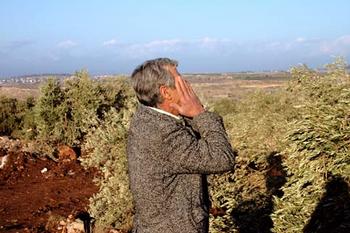
(A Palestinian farmer weeps at the bulldozing of his olive trees, photo by Gary Fields)
Because culiblog is a culinary weblog about food, food cultures, food as culture and so on, I feel obliged to breach the subject of olives, olive trees, olive tree culture, and olive trees as culture. In the past month I have seen Osama Qashoo’s documentary, My Dear Olive Tree, (at the IDFA), and Khalil Rabah’s installation piece (at the 9th International Istanbul Biennale), the Palestinian Museum of Natural History and Humankind. The olive tree as a symbol of Palestinian identity is used in both Rabah’s and Qashoo’s work.
Osama Qashoo is a recently exiled Palestinian film maker living and working in the UK. My Dear Olive Tree is his documentation of the destruction of the olive tree that he tended since childhood. The film depicts Qashoo as he witnesses the demolition of his olive tree and surrounding olive orchard, his own unwilling journey from Palestine to London, where he is reunited with a residual form of his dear olive tree on sale in an airport gift shop. At the beginning of the film Qashoo warns us that this is the last time he will see the olive tree, one tree of an entire grove in the Occupied Territories, a grove that sustained more than twenty families for generations with income from the olive oil.
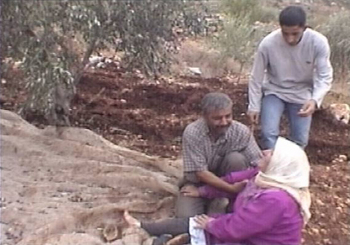
still from My Dear Olive Tree, courtesy of Osama Qashoo
The eighteen-minute documentary shifts swiftly from registering the small community’s warm familial bond with the land, to an extremely tense situation in which Israeli Army bulldozers move in to uproot the olive trees. The film shows Palestinian women in a state of utter hysteria as they are forced to bear witness to an act nothing short of an amputation. The film ends with a visit to an airport gift shop presumably en route to the UK, where, in some twisted form of fundraising, olive wood pendants cut into peace doves are being sold. Filmmaker Qashoo buys one of the trinkets and in the mean time the audience seems to have scratched deep grooves into the arm rests of their seats.
Khalil Rabah is an internationally acclaimed artist working in the field of conceptual art, installation and performance. Together with Zvi Goldstein he was the recipient of the Lennon-Oko Grant for Peace in 2003. His work reminds me quite strongly of the Neue Slovenische Kunst style of re-claiming and re-writing one’s own history with regard to cultural identity. Rabah’s Palestine before Palestine museum exhibit uses the olive tree and the installation-form to parody the history-writing effect that such a museum institution wields by its very presence. Rabah embeds the present-day context of Palestine and Palestinian identity within the context of a natural history museum, by describing the entire natural world in terms of the (occupied) olive tree.
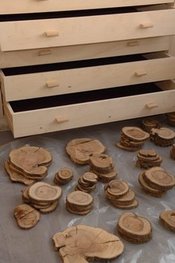
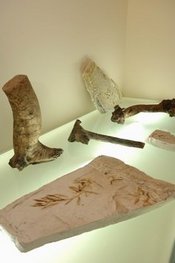
(images of the Palestinian Museum of Natural History and Humankind exhibit; Palestine before Palestine, courtesy of Khalil Rabah and the Istanbul Biennial)
In typical museum-style, the Palestinian Museum of Natural History and Humankind (PMNHH) opens cans of experts, declares facts and exhibits it’s acquisitions policy, manifest in projects such as the 3rd Annual Wall Zone Sale, an auction which took place at the Khalil Sakakini Cultural Centre in Ramallah in March of 2004. By auctioning off lots of material from around the wall zone, artist Rabah lobbied awareness of the social and ecological implications of the ~670km West Bank Barrier that Israel is currently building. The PMNHH also has a cafĂ© and a giftshop, complete with very helpful attendents ready and waiting to attend. But when one asks in all earnestness for a cup of tea, or if there is something to buy in the giftshop, the attendant just shakes her head and smiles. ‘Sorry, we have nothing to sell.’
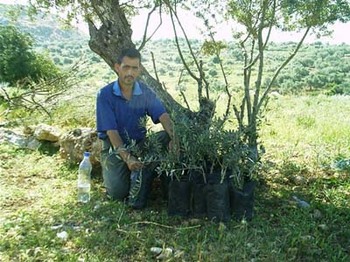
(A farmer replanting olive trees donated by the Palestinian Children’s Welfare Fund, image courtesy of the PCWF)
Some related links:
- Khalil Rabah at the 9th International Istanbul Biennial
- BBC News about the Lennon-Ono Grant for Peace
- IDFA information about Osama Qashoo’s film, My Dear Olive Tree
- What is the ‘Wall’? September Q&A by BBC News
- Neue Slowenische Kunst in Wikipedia
- Separation wall photos from the Palestinian Monitor
- Israeli Disengagement Plan according to Wikipedia
- Khalil Sakakini Cultural Centre in Ramallah
- Fair Trade Organic Olive Oil from Palestine
Zaytoun olive oil is pesticide-free extra-virgin, first cold press olive oil.
debra at 19:03 | | post to del.icio.us
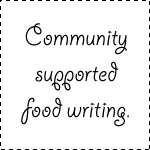
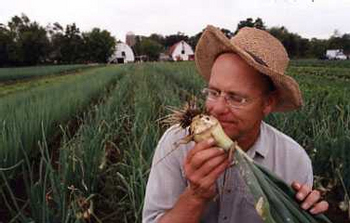
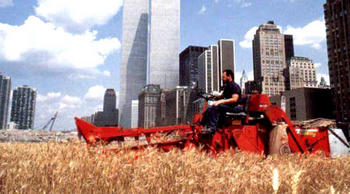

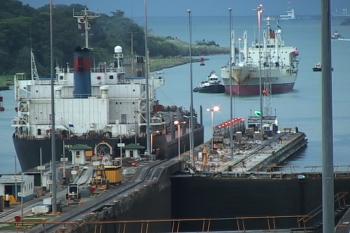
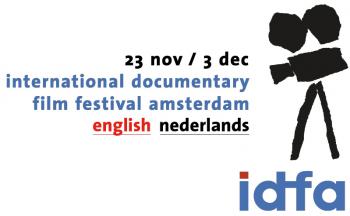
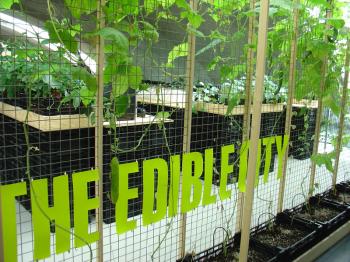
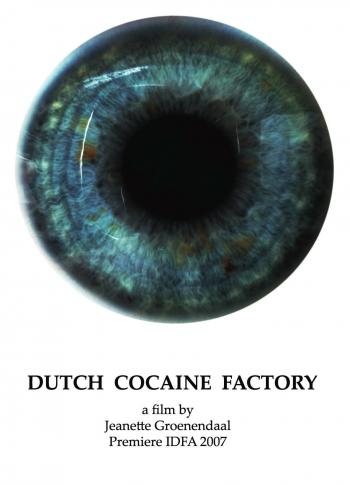
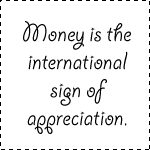









As a Palestinian Childrens Welfare Fund sponsor, I would like to thank you for featuring the image of the PCWF’s olive tree donation. I am proud, to be part of such a worthy cause.
Comment by Ray Mayes — December 12, 2005 @ 0:55
Dear Ray Mayes,
You are most welcome! You have every reason to be proud, for there would be no photograph without the olive tree planting initiative. Please continue to sponsor olive trees!
Warm regards,
Debra Solomon
Comment by Debra Solomon — December 12, 2005 @ 2:04
Thank you for your work. I visited Palestine.
I witnessed the land confiscations by the israeli soldiers, the bombed graves , the destruction of Palestinians homes.
I also met the most courageous people and the most beautiful children .
thanks for speaking about the olive trees, for showing the pictures, for telling the world about this.
gracias
lourdes
Comment by LOURDES PEREZ — December 12, 2005 @ 3:29
Dear Lourdes,
You’re welcome. This entry is just the small result of being impressed by the film and the installation of Qashoo and Rabah respectively. I compiled a food-related film programme from the IDFA 2005 offerings, and also paid special attention to all food-related art at the Istanbul Biennial this year. Both of these gentlemen brought this issue into focus for me. I am pleased when art and film are successful in expressing a messages outside of the mainstream media. I am glad you liked my entry.
Warm regards,
Debra Solomon
Comment by Debra Solomon — December 12, 2005 @ 9:30
“The film shows Palestinian women in a state of utter hysteria as they are forced to bear witness to an act nothing short of an amputation.”
After actually having visited real amputies, the products of terrorism in Israel. After walking to the funerals of children who were too young to speak words of hate, torn apart by shrapnel because they were jewish. I fail to see the equation between watching the world change around you and loosing your limb.
Israel and it’s local arab poplulation are comming to terms with a long an bloody struggle. There are no ‘good’ solutions, there is what we have. Would you rather suplant a few hundred olive trees or take 400,000 men, women and children from their homes? Often the only homes they’ve ever known.
Much is bemoned about the loss of a few trees, but no one mourns for Gush Katif. What about the farms of Gush Katif, that took generations to build and were amongst the most successfull in the world? The farmers that built it were thrown out of thier homes, and off their land, and now have neither. (BTW: they have recieved NO compensation for the taking of their land for the piece process). Israel left those farms for the Gaza arabs, and they were burnt to the ground in less than 2 days. Those farms, not but last year, employed over 10,000 Gaza arab workers, now jobless.
Olive groves were sacred to jews too. 60 years ago, before the state of Israel, jews owned massive farms, that were worked not only by jews but by arabs as well. The lands were purchased, not stolen. And arabs came from all over the middle east for the higher wages and better life that the new economies in israel were bringing. When Israel declared independence Jordan siezed many teritories owned, for nearly have a century by what were now Israelis. Areas that many now call settlements.
It would be well to remember that as we are doing our best to find peace, everyone is going through pain, even Israelis.
Comment by TheLoneCabbage — December 13, 2005 @ 0:54
Dear TLC at Harsh Angel dot com,
Thank you for your comment to my entry. I really appreciate your engagement and am proud that you feel comfortable (like others do) to express yourself here. The entry, Occupied Olive Tree Territories, is a description of a documentary film and an art installation, made by professionals in these fields.
Please correct me if I have interpreted your comment incorrectly, but I sense that you see this entry, this description of two artistic expressions, as a negation of all of the people (also Israeli) who have been, and are vicitms of the volatile situation in Israel and the Occupied Territories. Without making a personal attack on you, I find your language very ‘us and them’, in comparing the suffering of one, to the suffering of another.
“It would be well to remember that as we are doing our best to find peace, everyone is going through pain, even Israelis.” - TLC
Are you implying with this comment that when I describe two works of (let’s just call them) art that I am negating other histories? Because if you are, I do not agree with you. My report on two art products within the context of a weblog about food, food cultures, food as culture and the cultures that grow our food, DOES NOT NEGATE OTHER HISTORIES. Although I am not a political scientist, I am wise enough to accept that the political and ‘daily’ situation in Israel and the Occupied Territories is extremely complex, and most importantly, that the realties of this location are PLURAL in nature. Striving for concensus in terms of ‘a correct writing of history’ is unachievable, in my opinion. You are free to express you personal opinion here, as others have also done. But I do not see value in attempting to reach CONCENSUS as to who has suffered more because of this conflict.
I believe that conflicts can start to be resolved when there is room for and acceptance of many histories and geographies. I believe it is a mistake to endeavour a monoloithic throat-hold on the history and context of a region.
So let’s talk about terminology:
In your comment, you change, what I term, ‘Palestinian suffering at the loss of one’s land’, into ‘watching the world change around you’. These are radically different ‘reads’ of the situation. If we (me and you) are intending to resolve anything through discussion in these comments, we could only hope to achieve acceptance of the different ‘reads’ of historical context. I feel that I am doing that. I feel that you are NOT doing that.
In your comment you repeatedly use the term, ’several trees’. Try, if you will, to understand that this expression could be completely offensive (and therfore shut down all possible forms of communication) to anyone who sees these ’several trees’ as: a livelihood, a part of their identity, a physical connection to their history under threat, a future, a birthright… and I can go on and on. Whether or not you feel that one should be able to exchange THESE THINGS for peace is one thing, but if in your discussion you reduce a culture down to an actual number of trees, it is a negation of someone’s history and personal identity. This is what I cannot abide in your comment.
For how can you have a debate with someone if you do not believe that they have a history and an identity? To my way of thinking, one enters into discussion with another intelligent and sentient party, not an opportunistic and anachronistic idiot. I would never be caught dead in discussion with an opportunistic and anachronistic idiot. The consequence of this way of thinking, is that I need to respect that the people with whom I enter into discussion, come into that discussion with a context, THEIR OWN CONTEXT. I can accept that their context conflicts with mine, but I have no business talking with (or even talking about) someone whose existence I deny.
If you are offended by what I say in culiblog you have a few options:
1. express your opinion and expect others to respond, quite possibly NOT in agreement
2. don’t read the entries that express beliefs that you do not hold
3. reflect on what the possible outcome could be of 2 non-experts (you and me) discussing a matter of such incredible political importance between themselves on a niche weblog about food.
Once again, you are welcome to express yourself here, but… it’s a weblog fer gawd’s sakes about food cultures and food and culture. I will continue to talk about food within the platforms of art, design, and film. Accept that there will be differing opinions and try to be happy about this, as long as these expressions are not hateful or negating, I fail to see why this is a problem.
Warm regards,
Debra Solomon
Comment by Debra Solomon — December 13, 2005 @ 15:05
2am in the morning, I was a little shocked to see one of my favorite food blogs taking a political stance I find.. obviously, less than tastefull. I was more agressive than apropriate. Thankyou for the correction. (honestly)
My particular disagreement isn’t over the ‘issue’ as it were. But how one act is calously compared to another. Just as you disliked my choice of adverbs (ok a BIT slanted) I dislike, strongly, the equating of emotional damage to physical loss of life and limb. You can not compare the loss of property, something that while dificult to replace, CAN BE REPLACED, to the loss of life. By proposing the issue of a familial bond with land against “The Wall”, an implicit comparison of the two is made.
It is an accepted reality of law in every gonernance that your land may be apropriated, by the gov’t, for greater good. (current american politics not withstanding) The reason for the wall is clearly defined. It’s effectiveness at that task is debatable, but irrelevent. It is a legal process, no less so than building a new highway through some poor farmers land. CERTAINLY no less so that the Hitnakut (hebrew for the ‘Withdrawl’) Gush Katif. While one could argue that the Palastinians did not vote for the gov’t taking these actions, it is also true of the Israelis who were removed from Gush Katif(way too much to get into here).
The world IS changing. That is vastley more true in Israel than most other places. The Peace Process, even in a place like the middle east, is a massive upheval, and we are all coping the best we can. A Palastinian farmer may loose part of their orchard, or have to take a longer route to the next “town”. But they are not alone in this, Israelis are making painfull sacrifices, and not usually willingly.
Taking action to bring peace, in such a situation is always controversial. It’s usually a choice between lesser evils. Israels actions have been… not the happiest. But they are forced to act alone, as they have found no real partner for peace. The PA continues to refuse to take action against violent ‘activists’. If they did, you can be assured the PA would be on the recieving end of much criticism from the Arab world, at least as much as Israel does from the Western world.
To review Israels solutions in the past, the wall is the LEAST vile action they’ve taken to date. Israel is esentially choosing to seperate it’s self from the terrorists (as much as is possible in such a small area of land) rather that to continue it’s responsibility to fight terrorism within PA cities; a far more personal and violent acto to be certain. I honestly fear for the average Palestinian, because what the waring power brokers of their own people will do to them will pale the inequities of occupation.
I’m not defending the wall mind you. I think it amounts to drawing battle lines. I am defending the right of the Israeli gov’t to do what it deems necessary for the defense of it’s existance, and the minimizing of blood shed.
At the end of the day, it IS just a few trees. And they WILL be replanted. But when people die, which make no mistake is the alternative, they can not be replaced.
Comment by The Lone Cabbage — December 13, 2005 @ 20:36
Dear TLC,
First reaction to first sentence. I AM HONOURED that I am one of YOUR favourite food blogs. That’s a nice way to start a discussion, buffing up the ego of your sparring partner!
But here’s the deal:
I am at the moment en route and not near a good internet connection until Thursday afternoon Central European Time. I cannot adequately address your comment right now but don’t want to offend you. Would you mind terribly if we continued this on Thursday?
Something to think about: I will happily approve your comment and publish it, but my response to your comment will also be very long. We are sort of dominating the comment section with our discussion. Maybe this isn’t a bad thing, but maybe it is not the best place to do this. It is up to you, but if you like (and I have no idea who else is actually interested in our discussion), I would be happy to continue this discussion in email for the sake of the ‘ol FOOD blog. It’s your call. I also don’t mind responding on the blog (from Thursday) but I can also imagine that our discussion could go on for kilometres - maybe 670 kilometres - just as long as the Wall. ; P
Warm regards,
Debra Solomon
Comment by Debra Solomon — December 13, 2005 @ 23:13
Debra,
Thanks for sharing this. Although I live in Istanbul, I couldn’t follow the Biennal this year. That was a busy time in my life. I’d love to see that documentary. Maybe I have the chance on other festivals. Every year on March there’s Documentary Film Festival here. Maybe they screen it.
Comment by Isil — January 25, 2006 @ 0:02
I just would like to make few samll comments about the few trees been destroyed. First there are way more then few, rather thousands of trees destroyed every year, it may be worth also to remember that they represent one, if not the only source of income of most palestinians. Second I would like to point out that many israelian children died, so many more Palestinian children have died or are actually starving to death. If people are really interested in peace and not only in comndenning others, we should worry for all the children and humans involved in this conflict,and not only about the one we feel closer to us. I would also add that peace can never been reached by subjogating and abusing people, neither by the use of violence or by separation walls. I believe that only a just and fair solution, which does not grant rights to one part and negate it to the other, could achieve a durable peace; which I assume is what we all want. We can not think to achieve something by counting up-routed trees or dead children, for as even one is already too many.
Kind regards
Valentina
Comment by Valentina — February 1, 2006 @ 17:18
Hello,
I saw this documentary, and I am neither Muslim/Arab or Jewish/Israeli. I never knew anything about the olive trees. I grew up in America, and knew nothing much about the Palestinian point of view, until I began reading newspapers and information on-line.
I appreciate hearing both points of view. Especially one that I never see or hear about.
This documentary made me think about the book, ‘The Grapes of Wrath’ by John Steinbeck.
I can’t imagine such suffering- and I hope that I would never have to ever endure it. It is a luxury that we can sit on our computers and write about it.
Thanks,
M
Comment by Maria — April 17, 2006 @ 16:38